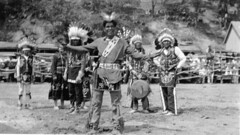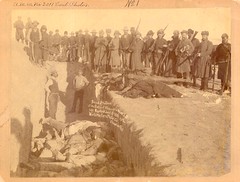| 5108257425 | Seward's Ice Box | The name given to Alaska when it was purchased from Russia for 7.2 million |  | 0 |
| 5108257426 | Alaska | The last frontier of the North American continent. It was purchased from Alaska in 1867 and was considered to be worthless lands; however, in time, this was proved to be not true. | 1 | |
| 5108257427 | Transcontinental Railroad | Completed in 1869 at Promontory, Utah, it linked the eastern railroad system with California's railroad system, revolutionizing transportation in the west. |  | 2 |
| 5108257428 | Central Pacific Railroad | Started in California, and pushed eastward; eventually connected with the Union Pacific Railroad in Promontory Point, Utah. Hired Chinese laborers to complete the work. |  | 3 |
| 5108257429 | Union Pacific Railroad | A railroad that started in Omaha, and it connected with the Central Pacific Railroad in Promontory Point, Utah. Hired inexpensive Irish laborers to work for the railroad. |  | 4 |
| 5108257430 | Wyoming and women's suffrage | Wyoming was the first state to provide women the right to vote in 1870. Elizabeth Cady Stanton visited the "land of freedom" in 1871, and when the territory became a state in 1890, women's suffrage remained in the constitution. | 5 | |
| 5108257431 | Standard Oil Corporation | A monopoly on oil, created by John D. Rockefeller in 1870. By 1890, the company owned 90% of the US oil market. |  | 6 |
| 5108257432 | John D Rockefeller | Was an American industrialist and philanthropist. Revolutionized the petroleum industry and defined the structure of modern philanthropy. |  | 7 |
| 5108257433 | "new immigrants" | Immigrants who came to the United States during and after the 1880s; most were from southern and eastern Europe. |  | 8 |
| 5108257434 | "old immigrants" | Immigrants who had come to the US before the 1880s from Britain, Germany, Ireland, and Scandinavia, or Northern Europe |  | 9 |
| 5108257435 | Yellowstone National Park | Established in 1872 by Congress, Yellowstone was the United States first national park and was supported by conservation president, Theodore Roosevelt. |  | 10 |
| 5108257436 | Credit Mobilier Scandal | This scandal occurred in the 1870s when a railroad construction company's stockholders used funds that were supposed to be used to build the Union Pacific Railroad for railroad construction for their own personal use. To avoid being convicted, stockholders even used stock to bribe congressional members and the vice president. |  | 11 |
| 5108257437 | Panic of 1873 | Financial panic in which banks closed and the stock market crashed |  | 12 |
| 5108257438 | Andrew Carnegie | A Scottish-born American industrialist and philanthropist who founded the Carnegie Steel Company in 1892. By 1901, his company dominated the American steel industry. |  | 13 |
| 5108257439 | US Steel | The largest steel company of the US, created by J.P. Morgan by merging Andrew Carnegie's Carnegie Steel and several other steel companies together; at the time, the largest corporation in existence. |  | 14 |
| 5108257440 | Bessemer Process | A way to manufacture steel quickly and cheaply by blasting hot air through melted iron to quickly remove impurities. |  | 15 |
| 5108257441 | Whiskey Ring Scandal | In 1875, before they were caught, a group of mostly Republican politicians were able to siphon off millions of dollars in federal taxes on liquor; the scheme involved an extensive network of bribes involving tax collectors, storekeepers, and others. |  | 16 |
| 5108257442 | Battle of Little Bighorn | In 1876, Indian leaders Sitting Bull and Crazy Horse defeated Custer's troops who tried to force them back on to the reservation, Custer and all his men died |  | 17 |
| 5108257443 | Nez Perce War | In this armed conflict between the Nez Perce and the US Gov. fought in 1877, the Indians refused to give up their lands to the US government and move to an Indian reservation when gold was discovered and they were ordered to leave. The Indians launched a valiant effort to maintain their land, but were ultimately defeated by the US Army. |  | 18 |
| 5108257444 | Great Railway Strike of 1877 | Railway workers in Virginia initiated a railway strike in 1877 to protest working conditions and wage cuts, lead to the "great labor uprising" | 19 | |
| 5108257445 | "A Century of Dishonor" | Written by Helen Hunt Jackson in 1881 to expose the atrocities the United States committed against Native Americans in the 19th century |  | 20 |
| 5108257446 | Chinese Exclusion Act | (1882) Denied any additional Chinese laborers to enter the country while allowing students and merchants to immigrate. |  | 21 |
| 5108257447 | Pendleton Act, 1883 | A federal law established in 1883 that stipulated that government jobs should be awarded on the basis od merit. Done to curb corruption. |  | 22 |
| 5108257448 | Grover Cleveland Elected | Republicans nominated Blaine as president but suspicions about his honesty led the Mugwumps to campaign for Democratic nominee Grover Cleveland (honest, frugal, mayor of Buffalo, later governor of NY, fathered an illegitimate child which raised questions) |  | 23 |
| 5108257449 | James Garfield | 1880; Republican; president for only 4 months before being assassinated by Charles Guiteau; promoted civil service reform but did not live to see it enacted. |  | 24 |
| 5108257450 | Huckleberry Finn | The protagonist and narrator of the novel. Huck is the thirteen-year-old son of the local drunk of St. Petersburg, Missouri, a town on the Mississippi River. Frequently forced to survive on his own wits and always a bit of an outcast, Huck is thoughtful, intelligent (though formally uneducated), and willing to come to his own conclusions about important matters, even if these conclusions contradict society's norms. Nevertheless, Huck is still a boy, and is influenced by others, particularly by his imaginative friend, Tom. |  | 25 |
| 5108257451 | Mark Twain | The writer and humorist best known for his novels about Tom Sawyer and Huckleberry Finn (1835-1910); used "realistic fiction". |  | 26 |
| 5108257452 | Haymarket Square Riot | (1886) A demonstration of striking laborers in Chicago in 1886 that turned violent, killing a dozen people and injuring over a hundred. |  | 27 |
| 5108257453 | American Federation of Labor | 1886; founded by Samuel Gompers; sought better wages, hrs, working conditions; skilled laborers, arose out of dissatisfaction with the Knights of Labor, rejected socialist and communist ideas, non-violent. |  | 28 |
| 5108257454 | Interstate Commerce Act | 1887 law passed to regulate railroad and other interstate businesses |  | 29 |
| 5108257455 | Dawes Act | 1887 law that distributed reservation land to individual Native American owners in 150 acre plot leaving millions of acres of native land to be sold and divided by US government. |  | 30 |
| 5108257456 | Gospel of Wealth | This was a book written by Carnegie that described the responsibility of the rich to be philanthropists. This softened the harshness of Social Darwinism as well as promoted the idea of philanthropy. |  | 31 |
| 5108257457 | Andrew Carnegie | A Scottish-born American industrialist and philanthropist who founded the Carnegie Steel Company in 1892. By 1901, his company dominated the American steel industry. |  | 32 |
| 5108257458 | J P Morgan | Banker that controlled 2/3 of the rail roads and eventually merged into the steel industry. Bought Carnegies steel company and formed U S Seel Company |  | 33 |
| 5108257459 | Captains of Industry | Owners and managers of large industrial enterprises who wielded extraordinary political and economic power |  | 34 |
| 5108257460 | Robber Barons | Refers to the industrialists or big business owners who gained huge profits by paying their employees extremely low wages. They also drove their competitors out of business by selling their products cheaper than it cost to produce it. Then when they controlled the market, they hiked prices high above original price. |  | 35 |
| 5108257461 | Hull House | Settlement home designed as a welfare agency for needy families. It provided social and educational opportunities for working class people in the neighborhood as well as improving some of the conditions caused by poverty. |  | 36 |
| 5108257462 | Bison Extinct | Bison had been hunted to near extinction by 1900. | 37 | |
| 5108257463 | Jacob Riis | A Danish immigrant, he became a reporter who pointed out the terrible conditions of the tenement houses of the big cities where immigrants lived during the late 1800s. He wrote How The Other Half Lives in 1890. |  | 38 |
| 5108257464 | Lincoln Steffans | Wrote muckraking articles in "Tweed Days in St. Louis" (1902). He wrote "The Shame of the Cities" (1904) which caused a sensation by describing in detail the corrupt that characterized big-city politics. | 39 | |
| 5108257465 | Sherman Anti-Trust Act | 1890, First federal action against monopolies, it was signed into law by Harrison and was extensively used by Theodore Roosevelt for trust-busting. However, it was initially misused against labor unions |  | 40 |
| 5108257466 | Wounded Knee | In 1890, after killing Sitting Bull, the 7th Cavalry rounded up Sioux at this place in South Dakota and 300 Natives were murdered and only a baby survived. |  | 41 |
| 5108257467 | Annexation of Hawaii | U.S. wanted Hawaii for business and so Hawaiian sugar could be sold in the U.S. duty free, Queen Liliuokalani opposed so Sanford B. Dole overthrew her in 1893, William McKinley convinced Congress to annex Hawaii in 1898 |  | 42 |
| 5108257468 | Ellis Island | Immigration processing center that open in New York Harbor in 1892 |  | 43 |
| 5108257469 | Homestead Steel Strike | A violent labor conflict at the Homestead Steel Works near Pittsburgh, Pennsylvania, that occurred when its president, Henry Clay Frick, refused to renew the union contract with Amalgamated Association of Iron and Steel Workers. The strike, which began on June 29, 1892, culminated in an attempt on Frick's life and was swiftly put down by state militias. The strike marks one of the great setbacks in the emerging industrial-union movement. |  | 44 |
AP US Period 6 (1865-1898) Flashcards
Primary tabs
Need Help?
We hope your visit has been a productive one. If you're having any problems, or would like to give some feedback, we'd love to hear from you.
For general help, questions, and suggestions, try our dedicated support forums.
If you need to contact the Course-Notes.Org web experience team, please use our contact form.
Need Notes?
While we strive to provide the most comprehensive notes for as many high school textbooks as possible, there are certainly going to be some that we miss. Drop us a note and let us know which textbooks you need. Be sure to include which edition of the textbook you are using! If we see enough demand, we'll do whatever we can to get those notes up on the site for you!

